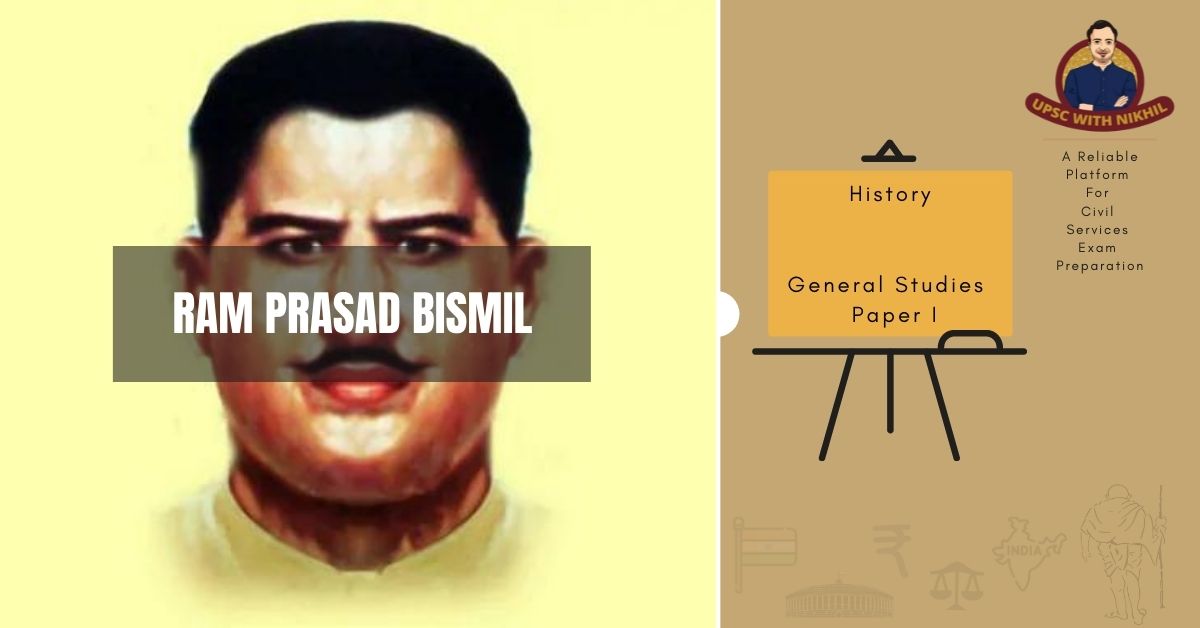Ram Prasad Bismil
“Desh hit paida huye hai
Desh par marr jayenge
Marte marte desh ko
zinda magar kar jayenge”
The famous freedom fighter Ram Prasad Bismil was involved in the historic Kakori train robbery. He was born in Shahjahanpur, Uttar Pradesh, in 1897. Muralidhar, his father, worked for the Shahjahanpur Municipality. Ramaprasad learned Hindi from his father and was assigned to Moulvi to learn Urdu. Despite his father's disapproval, he wanted to attend an English medium school and was accepted into one.
Ram Prasad Bismil was one of the most notable Indian revolutionaries who fought British colonialism and made it possible for the nation to breathe the air of freedom after centuries of struggle against imperial forces, with a desire for freedom and revolutionary spirit reverberating in every inch of his body and poetry.
Bismil began writing powerful patriotic poems in Urdu and Hindi under the pen names 'Bismil,' 'Ram,' and 'Agyat,' among others. After reading the death sentence passed on Bhai Parmanand, an Indian nationalist and Arya Samaj missionary, the ideals of freedom and revolution became ingrained in his mind. His poem ‘Mera Janm' was a vehicle for him to express his rage. He was only 18 at the time.
His ideals of freedom struggle were diametrically opposed to Mahatma Gandhi's, and he was quoted as saying, "Independence will not be achieved through nonviolence."
After clashing with the Congress party and growing resentment, he founded the Hindustan Republic Association, which quickly grew to include leaders such as Bhagat Singh and Chandrashekhar Azad.
Bismil's participation in the Mainpuri conspiracy of 1918 cemented his reputation as a prominent freedom fighter. Bismil, along with Genda Lal Dixit, an Auraiya schoolteacher, organised youth from Etahwah, Mainpuri, Agra, and Shahjahanpur districts to strengthen their organisations, the ‘Matrivedi' and the ‘Shivaji Samiti.' On January 28, 1918, he published a pamphlet titled "Deshwasiyon ke Naam" and distributed it along with his poem "Mainpuri ki Pratigya." They raided government coffers to raise money for the parties.

Ram Prasad Bismil, along with Ashfaqulla Khan and others, carried out the plan to rob the train at Kakori, near Lucknow, on August 9, 1925. After stopping the 8-Down Saharanpur Lucknow passenger train at Kakori, revolutionaries Ashfaqullah Khan, Sachindra Bakshi, Rajendra Lahiri, and Ram Prasad Bismil subdued the guard and looted treasury funds. More than a dozen HRA members were arrested by colonial authorities less than a month after the attack.
These four revolutionaries were sentenced to death after their trial in the so-called Kakori conspiracy. Bismil wrote his autobiography, which is considered one of the best works of Hindi literature, as well as the cult song "Mera rang de Basanti chola," in Barrack 11 of Lucknow Central Jail. On December 19, 1927, the 30-year-old Bimil was hanged in the Gorakhpur jail and cremated on the banks of the Rapti river with the words "Jai Hind" on his lips. Raj Ghat was the name given to the location later on.
He was a member of the Arya Samaj and was inspired by Swami Dayanand Saraswati's books. He was born to a civic worker and was forced to drop out of school due to a lack of funds. But that didn't stop him from reading and writing poetry.
The poems 'Man Ki Lahar' and 'Swadeshi Rang' by Ram Prasad Bismil are well-known. Ram Prasad Bismil's war cry was the famous lines "Sarfaroshi ki tamanna ab hamare dil mein hai, dekhna hai zor kitna baazu-e-qatil mein hai" written by Urdu poet Bismil Azimabadi (Not to be confused with Ram Prasad Bismil).
Brahmacharya practise inspired him greatly, and he became a devout follower. He became involved in the Shahjahanpur Seva Samithi's volunteer programme. He published a pamphlet called "A Message to My Countrymen" to get people's attention. Ramaprasad translated many Bengali works into Hindi.
His works include the following:
•The Bolshevik Programme
• A Sally of the Mind
• Swadeshi Rang
• Catherine
Ramaprasad translated Rishi Aurobindo's Yogic Sadhana. All of his works were collected in the ‘Sushil Mala' series.


